- Home
- Patricia Highsmith
Mermaids on the Golf Course: Stories Page 10
Mermaids on the Golf Course: Stories Read online
Page 10
“Oo-woo-woo,” said the puppy, crouching.
“One second, Zeke, darling!” Michèle hurried to get his leash.
She flung on a fur jacket, and she and Zeke went out.
Zeke at once made for the gutter, and Michèle gave him a word of praise. The fancy grocery store across the street was open, and Michèle bought a box of candy—a beautiful tin box costing over a hundred francs—because the red ribbon on it had caught her eye.
“Madame—bonjour!”
Once more Michèle looked down at Paul’s upturned face. His nose was bright pink with cold.
“Happy Christmas again, madame!” Paul said, smiling, stamping his feet. He wore the brown pair of new shoes. His hands were rammed into his pockets.
“Would you like a hot chocolate?” Michèle asked. A bar-tabac was just a few meters distant.
“Non, merci.” Paul twisted his neck shyly.
“Or soup!” Michèle said with inspiration. “Come up with me!”
“My sister is with me.” Paul turned quickly, stiff with cold, and at that moment Marie-Jeanne dashed out of the bar-tabac.
“Ah, bonjour, madame!” Marie-Jeanne was grinning, carrying a blue straw shopping bag which looked empty, but she opened it to show her brother. “Two packs. That’s right?—Cigarettes for my father,” she said to Michèle.
“Would you like to come up for a few minutes and see my Christmas tree?” Michèle’s hospitality still glowed strongly. What was wrong with giving these two a bowl of hot soup and some candy?
They came. In the apartment, Michèle switched on the radio to London, which was giving out with carols. Just the thing! Marie-Jeanne squatted in front of the Christmas tree and chattered to her brother about the pretty packages amassed at the base, the decorations, the little presents perched in the branches. Michèle was heating a tin of split pea soup to which she had added an equal amount of milk. Good nourishing food! The English choirboys sang a French carol, and they all joined in:
Il est né le divin enfant . . .
Chantez hautbois, résonnez musettes . . .
Then as before they were gone all too suddenly—their laughter and chatter—Zeke barked as if to call them back, and Michèle was left with the empty soup bowls and crumpled chocolate papers to clear away. Impulsively Michèle had given them the pretty cookie box to take home. And Charles was due in a few minutes. Michèle had tidied the kitchen and was walking into the living room, when she heard the click of the lift door and Charles’s step in the hall, and at the same time noticed a gap on the mantel. The clock! Charles’s ormolu clock! It couldn’t be gone. But it was gone.
A key was fitted into the lock, and the door opened.
Michèle seized a box—yellow-wrapped, house slippers for Charles—and set it where the clock had been.
“Hello, darling!” Charles said, kissing her.
Charles wanted a cup of tea: the temperature was dropping and he had nearly caught a chill waiting for a taxi just now. Michèle made tea for both of them, and tried to seat herself so that Charles would take a chair that put his back to the fireplace, but this didn’t work, as Charles took a different armchair from the one Michèle had intended.
“What’s the idea of a present up there?” Charles asked, meaning the yellow package.
Charles had an eye for order. Smiling, still in a good mood, he left his first cup of tea and went to the mantel. He took the package, turned towards the Christmas tree, then looked back at the mantel. “And where’s the clock? You took it away?”
Michèle clenched her teeth, longing to lie, to say, yes, she’d put it in a cupboard in order to have room for Christmas decorations on the mantel, but would that make sense? “No, I—”
“Something the matter with the clock?” Charles’s face had grown serious, as if he were inquiring about the health of a member of the family whom he loved.
“I don’t know where it is,” Michèle said.
Charles’s brows came down and his body tensed. He tossed the lightweight package down on the table where the tree stood. “Did you see that boy again?—Did you invite him up?”
“Yes, Charles. Yes—I know I—”
“And today was perhaps the second time he was here?”
Michèle nodded. “Yes.”
“For God’s sake, Michèle! You know that’s where my letter-opener went too, don’t you? But the clock! My God, it’s one hell of a lot more important! Where does this kid live?”
“I don’t know.”
Charles made a move towards the telephone and stopped. “When was he here? This afternoon?”
“Yes, less than an hour ago. Charles, I really am sorry!”
“He can’t live far from here.—How could he have done it with you here with him?”
“His sister was here too.” Michèle had showed her where the bathroom was. Of course Paul had taken the clock, then, put it in that blue shopping bag.
Charles understood, and nodded grimly. “Well, they’ll have a nice Christmas, pawning that. And I’ll bet we won’t see either of them around here for the next many days—if ever. How could you bring such hoodlums into the house?”
Michèle hesitated, shocked by Charles’s wrath. It was wrath turned against her. “They were cold and they were hungry—and poor.” She looked her husband in the eyes.
“So was my father,” Charles said slowly, “when he acquired that clock.”
Michèle knew. The ormolu clock had been the Clement family’s pride and joy since Charles had been twelve or so. The clock had been the one handsome item in their working-class household. It had caught Michèle’s eye the first time she had visited the Clements, because the rest of the furnishings were dreadful style rustique, all varnish and formica. And Charles’s father had given the clock to them as a wedding present.
“Filthy swine,” Charles murmured, drawing on a cigarette, looking at the gap on the mantel. “You don’t know such people perhaps, my dear Michèle, but I do. I grew up with them.”
“Then you might be more sympathetic! If we can’t get the clock back, Charles, I’ll buy another for us, as near like it as possible. I can remember exactly how that clock looked.”
Charles shook his head, squeezed his eyes shut and turned away.
Michèle left the room, taking the tea things with her. It was the first time she had seen Charles near tears.
Charles did not want to go to the dinner party to which they were invited that evening. He suggested that Michèle go alone and make some excuse for him, and Michèle at first said she would stay at home too, then changed her mind and got dressed.
“I don’t see what’s the matter with my idea of buying another clock,” Michèle said. “I don’t see—”
“Maybe you’ll never see,” Charles said.
Michèle had known Bernard and Yvonne Petit a long time. Both had been friends of Michèle’s before she and Charles were married. Michèle wanted very much to tell Yvonne the story about the clock, but it was not a story one could tell at a dinner table of eight, and by coffee time Michèle had decided it was best not to tell it at all: Charles was seriously upset, and the mistake was her own. But Yvonne, as Michèle was leaving, asked her if something was on her mind, and Michèle was relieved to admit there was. She and Yvonne went into a library much like the one in Michèle’s apartment, and Michèle told the story quickly.
“We’ve got just the clock you need here!” said Yvonne. “Bernard doesn’t even much like it. Ha! That’s a terrible thing to say, isn’t it? But the clock’s right here, darling Michèle. Look!” Yvonne pushed aside some invitation cards, so that the clock on the library mantel showed plainly on its splayed base: black hands, its round face crowned with a tiara of gilded knobs and curlicues.
The clock was indeed very like the one that had been stolen. While Mi
chèle hesitated, Yvonne found newspaper and a plastic bag in the kitchen and wrapped the clock securely. She pressed it into Michèle’s hands. “A Christmas present!”
“But it’s the principle of the thing. I know Charles. So do you, Yvonne. If the clock that was stolen were from my family, if I’d known it all my life, even, I know it wouldn’t matter to me so much.”
“I know, I know.”
“It’s the fact that these kids were poor—and that it’s Christmas. I asked them in, Paul first, by himself. Just to see their faces light up was so wonderful for me. They were so grateful for a bowl of soup. Paul told me they live in a basement somewhere.”
Yvonne listened, though it was the second time Michèle had told her all this. “Just put the clock on the mantel where the clock was—and hope for the best.” Yvonne spoke with a confident smile.
When Michèle got home by taxi, Charles was in bed reading. Michèle unwrapped the clock in the kitchen and set it on the mantel. Amazing how much it did look like the other clock! Charles, behind his newspaper, said that he had taken Zeke out for a walk half an hour ago. Otherwise Charles was silent, and Michèle did not try to talk to him.
The next morning, Christmas Eve, Charles spotted the new clock on the mantel as he walked into the living room from the kitchen, where he and Michèle had just breakfasted. Charles turned to Michèle with a shocked look in his eyes. “All right, Michèle. That’s enough.”
“Yvonne gave it to me. To us. I thought—just for Christmas—” What had she thought? How had she meant to finish that sentence?
“You do not understand,” he said firmly. “I gave the police a description of that clock last night. I went to the police station, and I intend to get that clock back! I also informed them of the boy aged ‘about ten’ and his sister who live somewhere in the neighborhood in a basement.”
Charles spoke as if he had declared war on a formidable enemy. To Michèle it was absurd. Then as Charles talked on in his tone of barely repressed fury about dishonesty, handouts to the irresponsible, to those who had not earned them or even tried to, about hooligans’ disrespect for private property, Michèle began to understand. Charles felt that his castle had been invaded, that the enemy had been admitted by his own wife—and that she was on their side. Are you a Communist, Charles might have asked, but he didn’t. Michèle didn’t consider herself a Communist, never had.
“I simply think the rich ought to share,” she interrupted.
“Since when are we rich, really rich, I mean?” Charles replied. “Well, I know. Your family, they are rich and you’re used to it. You inherited it. That’s not your fault.”
Why on earth should it be her fault, Michèle wondered, and began to feel on surer ground. She had read often enough in newspapers and books that wealth had to be shared in this century, or else. “Well—and as for these kids, I’d do the same thing again,” she said.
Charles’s cheeks shook with exasperation. “They insulted us! This was thievery!”
Michèle’s face grew warm. She left the room, as furious as Charles. But Michèle felt that she had a point. More than that, that she was right. She should put it into words, organize her argument. Her heart was beating fast. She glanced at the open bedroom door, expecting Charles’s figure, expecting his voice, asking her to come back. There was silence.
Charles went off to his office half an hour later, and said he would probably not be back before 3:30. They were to go to his parents’ house between four and five. Michèle rang up Yvonne, and in the course of their conversation Michèle’s thoughts became clearer, and her trickle of tears stopped.
“I think Charles’s attitude is wrong,” Michèle said.
“But you mustn’t say that to a man, dear Michèle. You be careful.”
That afternoon at four, Michèle began tactfully with Charles. She asked him if he liked the wrapping of the present for his mother. The package contained the white tablecloth, which she had shown Charles.
“I’m not going. I can’t.” He went on, over Michèle’s protestations. “Do you think I can face my parents—admit to them that the clock’s been stolen?”
Why mention the clock, unless he wanted to ruin Christmas, Michèle thought. She knew it was useless to try to persuade him to come, so she gave it up. “I’ll go—and take their presents.” So she did, and left Charles at home to sulk, and to wait for a possible telephone call from the police, he had said.
Michèle had gone out laden with Charles’s parents’ presents as well as those for her own parents. Charles had said he would turn up at her parents’ Neuilly apartment at 8 P.M. or so. But he did not. Michèle’s parents suggested that she telephone Charles: maybe he had fallen asleep, or was working and had lost track of time, but Michèle did not telephone him. Everything was so cheerful and beautiful at her parents’ house—their tree, the champagne buckets, her nice presents, one a travel umbrella in a leather case. Charles and the clock story loomed like an ugly black shadow in the golden glow of her parents’ living room, and Michèle again blurted out the events.
Her father chuckled. “I remember that clock—I think. Nothing so great about it. It wasn’t made by Cellini after all.”
“It’s the sentiment, however, Edouard,” said Michèle’s mother. “A pity it had to happen just at Christmas. And it was careless of you, Michèle. But—I have to agree with you, yes, they were simply little urchins of the street, and they were tempted.”
Michèle felt further strengthened.
“Not the end of the world,” Edouard murmured, pouring more champagne.
Michèle remembered her father’s words the next day, Christmas Day, and on the day after. It was not the end of the world, but the end of something. The police had not found the clock, but Charles believed they would. He had spoken to them with some determination, he assured Michèle, and had brought them a colored drawing of the clock which Charles had made at the age of fourteen.
“Naturally the thieves wouldn’t pawn it so soon,” Charles said to Michèle, “but they’re not going to drop it in the Seine either. They’ll try to get cash for it sooner or later, and then we’ll nail them.”
“Frankly, I find your attitude unchristian and even cruel,” said Michèle.
“And I find your attitude—silly.”
It was not the end of the world, but it was the end of their marriage. No later words, no embrace if it ever came, could compensate Michèle for that remark from her husband. And, just as vital, she felt a deep dislike, a real aversion to her within Charles’s heart and mind. And she for him? Was it not a similar feeling? Charles had lost something that Michèle considered human—if he had ever had it. With his poorer, less privileged background, Charles should have had more compassion than she, Michèle thought. What was wrong? And what was right? She felt muddled, as she sometimes did when she tried to ponder the phrases of carols, or of some poems, which could be interpreted in a couple of ways, and yet the heart, or sentiment always seemed to seek and find a path of its own, as hers had done, and wasn’t this right? Wasn’t it right to be forgiving, especially at this time of year?
Their friends, their parents counseled patience. They should separate for a week or so. Christmas always made people nervous. Michèle could come and stay at Yvonne’s and Bernard’s apartment, which she did. Then she and Charles could talk again, which they did. But nothing really changed, not at all.
Michèle and Charles were divorced within four months. And the police never found the clock.
A Shot from
Nowhere
The hotel room in which Andrew Spatz lay was yellowish and vaguely dusty, like the dry little plaza beyond his single window, like the town itself. The town was called Quetzalan. Three days ago, Andrew had taken a local bus from the city of Jalapa, not caring where the bus wandered to, and he had got off with his suitcase and box of oil paints, brushes and s
ketch pads in this town, because it had pleased him at his first glimpse through the bus window. It looked like a town that nobody knew of or cared about. It looked real. And on the plaza he had found the Hotel Corona, maybe the only hotel in the town.
Now, unfortunately, he was suffering from the usual intestinal cramps, and since yesterday he thought he had a fever, though in the heat it was hard to tell. In the early mornings, he set out and walked up in the hills around the town and made sketches to be used later, possibly, for paintings. He sketched everywhere, from an iron bench in the plaza, from a curb, from a table in a bar. But when noon came, and after he had had a simple meal of tacos and beans and a beer, it was time to hide from the sun for a few hours, like everyone else. Quetzalan fell silent as a ghost town from half past twelve until nearly four every afternoon. And the yellow sun bore down with unnecessary force, as if to grind into the consciousness of man and beast and plant the fact that it had conquered, that rain and coolness were far away, maybe gone forever. Andrew had strange dreams when he dozed in the afternoons.
On one afternoon he awakened from a dream of red snakes in a cave in a desert. The snakes did not notice him in the dream, he did not feel in any danger, but the dream was disturbing. Andrew threw off the sheet he had pulled over himself against the inevitable fly or two, and went to the basin in the corner of his room. He took off his drip-dry shirt, wet it again in cool water, and put it back on. His window was open about ten inches top and bottom, but no breeze came.
Andrew glanced at the window, and a movement outside caught his attention.
There was the boy again, with his milk pan for the kittens. The boy looked about thirteen, barefoot in soiled white trousers and white shirt with sleeves rolled up. He was only some six yards away from where Andrew stood in his room, so Andrew could see clearly the tin pie plate and the milk in it. Now as a skinny brindle kitten staggered from some bushes in the plaza, Andrew knew that the boy was going to draw the pan back, as he had done before.

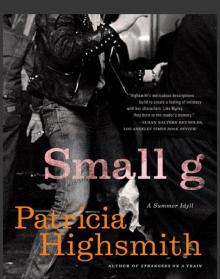 Small G: A Summer Idyll
Small G: A Summer Idyll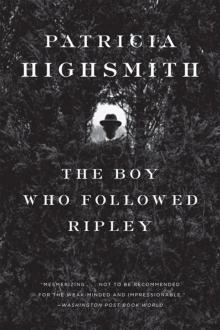 The Boy Who Followed Ripley
The Boy Who Followed Ripley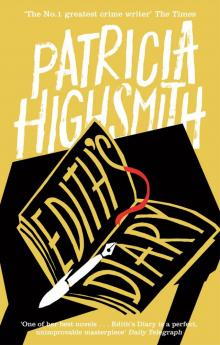 Edith's Diary
Edith's Diary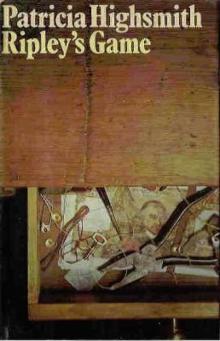 Ripley's Game
Ripley's Game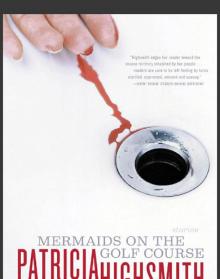 Mermaids on the Golf Course: Stories
Mermaids on the Golf Course: Stories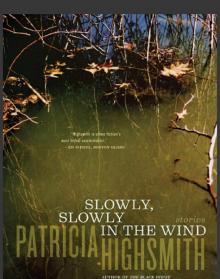 Slowly, Slowly in the Wind
Slowly, Slowly in the Wind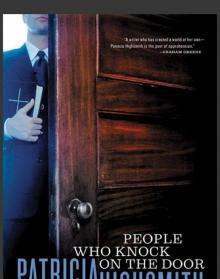 People Who Knock on the Door
People Who Knock on the Door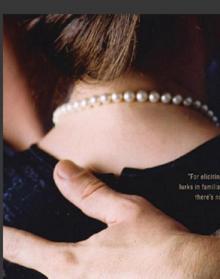 The Glass Cell
The Glass Cell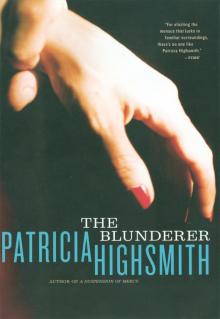 The Blunderer
The Blunderer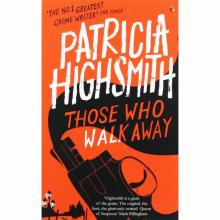 Those Who Walk Away
Those Who Walk Away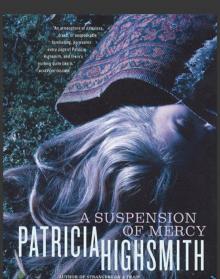 A Suspension of Mercy
A Suspension of Mercy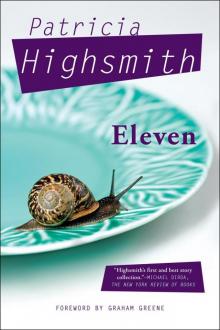 Eleven
Eleven Found in the Street
Found in the Street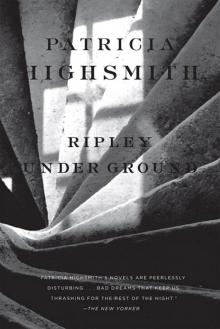 Ripley Under Ground
Ripley Under Ground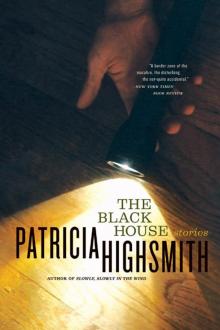 The Black House
The Black House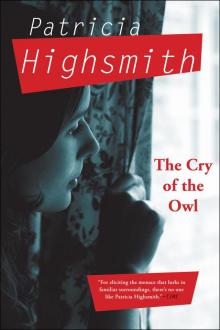 The Cry of the Owl
The Cry of the Owl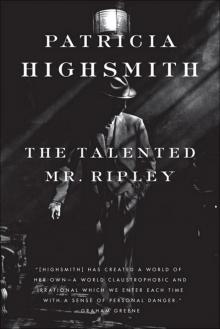 The Talented Mr. Ripley
The Talented Mr. Ripley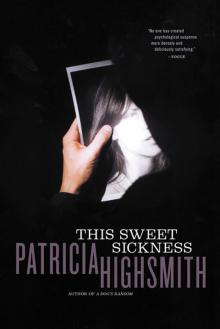 This Sweet Sickness
This Sweet Sickness The Two Faces of January
The Two Faces of January The Animal-Lover's Book of Beastly Murder
The Animal-Lover's Book of Beastly Murder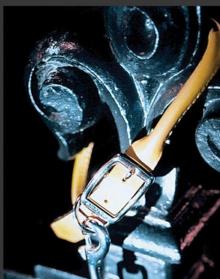 A Dog's Ransom
A Dog's Ransom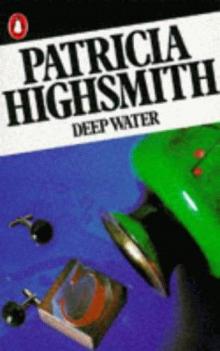 Deep Water
Deep Water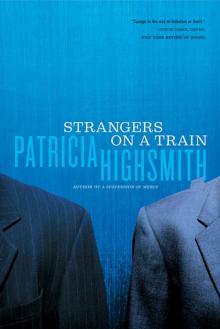 Strangers on a Train
Strangers on a Train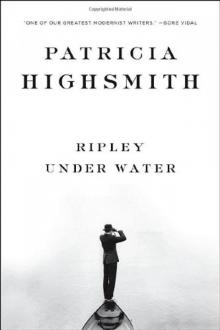 Ripley Under Water
Ripley Under Water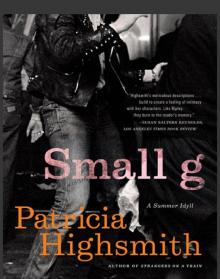 Small g
Small g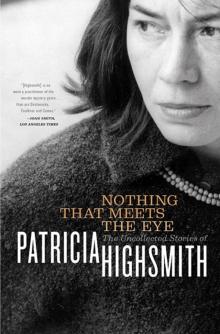 Nothing That Meets the Eye
Nothing That Meets the Eye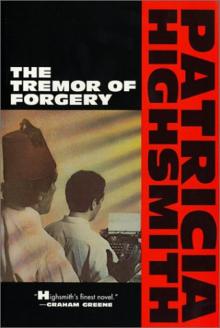 Patricia Highsmith - The Tremor of Forgery
Patricia Highsmith - The Tremor of Forgery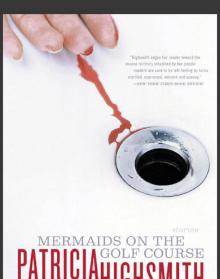 Mermaids on the Golf Course
Mermaids on the Golf Course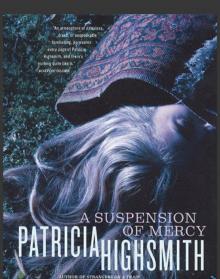 Suspension of Mercy
Suspension of Mercy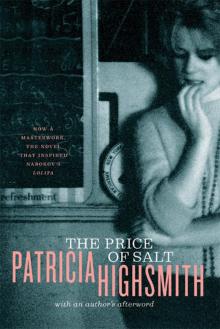 The Price of Salt, or Carol
The Price of Salt, or Carol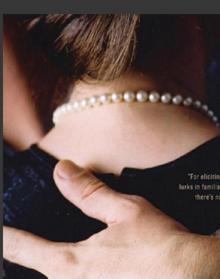 Glass Cell
Glass Cell